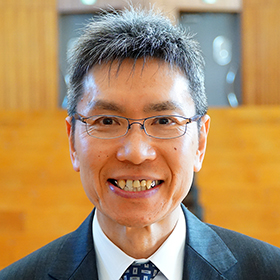Yoshikazu Suzuki, Professor of Tokyo University of Foreign Studies, Graduate School of International Studies Institute, was the speaker of Global Career Course this time.
Entitled “Japan’s understandings of Russia and Japan – Russia Relations; the Significance of Regional and International Relations Research”, he talked about what is required in order to succeed internationally along with his own studies.

“Russia is close but also distant.” he began. Prof. Suzuki first showed how close Japan and Russia are geographically using a map. He followed by showing data on the “psychological distance” between the two countries.

According to the survey on “Feeling of Closeness of Japanese people towards Russia” and “The Current Relationship between Russia and Japan”, the majority of Japanese people hold a negative image toward Russia. On the other hand, the images of Japanese people by Russians are mostly positive. The students were surprised at this big difference.

In addition, students heard an experience of Russian exchange student, who was shocked at hearing Japanese college students having image of Russians’ “appearance is cold and emotions do not appear on their faces”, which is completely opposite. After looking at the smiling photos of President Putin on the web, who may have influenced Russians’ image of “scary” and “cold”, the country “Russia” became more familiar to them.

Then, Prof. Suzuki introduced how Russian politics are described; Due to the huge Ruling Party politics and the mass media control, Russia is often said that they are becoming to have authoritarianism instead of original democratization working in the past. Moreover, due to the support of eastern Ukraine separatist and the annexation of the Crimea Republic, Russia is often told that they are in expansionism and not following the international community rules.

“Although Russia is tend seen in negative stereotypes, Russia has its own justice. What is important is to know the background and cause of the problem that is happening,” said Prof. Suzuki.
Lyrics of “Dragon Night” by popular artist among teens, SEKAI NO OWARI, were cited, and students gained their own sympathy to understanding the others.

“What is required for researchers to understand is first to know well about the country. Consider it critically and analyze it to find out what kind of problems may occur. In order to reach these important conclusions we must learn the language. Analyzing from different viewpoints is also necessary. Interdisciplinary research is also a requirement.”
This approach to understanding a nation made students interested in a global career and those who are less so realize what is important to live in an international society.

Finally, Prof. Suzuki delivered a message of advice on attitudes needed to succeed internationally. He said, study of English is necessary, but to pursue cultural differences with Japan with honest curiosity is more important than anything to learn about different cultures both in university and abroad. If students find something that is interesting to them, they should try to deepen their understanding of it. ”

The students asked questions after the lecture like “How do you think Russia will be in the near future?” “What do you think is necessary in order to make a good relationship between Japan and Russia?”. Some students were eager to listen to his stories even during break time. The atmosphere is the room began to reflect the desire of the students to learn.


Always having curiosity and seeing the world with a fresh view — this encapsulates Prof. Suzuki’s posture and attitude as a researcher and it was delivered consistently during the lecture which worked to motivate students.





